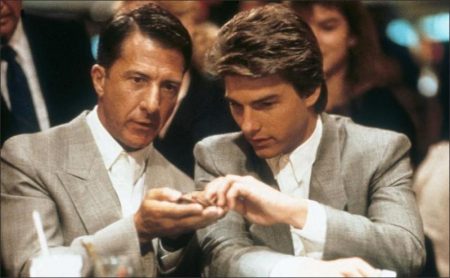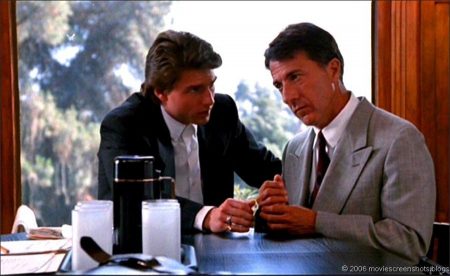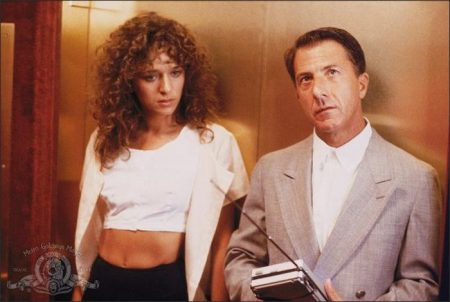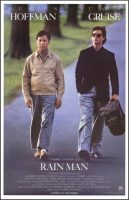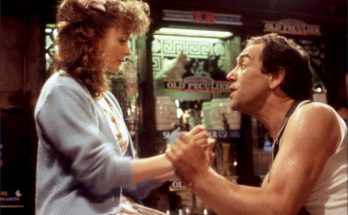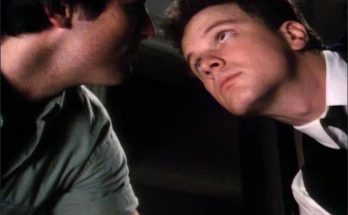Rain Man movie synopsis. When Charlie Babbitt (Tom Cruise), a fast-talking automobile salesman in Los Angeles, returns to Cincinnati for his father’s funeral, he finds that he has inherited a pocket watch and a 1949 Buick Roadmaster convertible. The pocket watch and Roadmaster are in mint condition, and Charlie had been estranged from his father for years, but still he is disappointed.
The disappointment turns to fury when Charlie learns that his father’s $3 million fortune has been left to Raymond (Dustin Hoffman), Charlie’s autistic older brother of whose existence he has been completely ignorant. To get his hands on the money, Charlie kidnaps the helpless Raymond, who has been confined to an institution, and sets off for Los Angeles, aiming to have himself declared Raymond’s legal guardian.
”Rain Man,” directed by Barry Levinson from the screenplay by Ronald Bass and Barry Morrow, is both a road movie and the oddest of this year’s brother-movies in which one brother, a sophisticated hustler, and the other, an innocent abroad, realize they are good for each other.
The difference, however, is that Mr. Hoffman’s innocent exists in a never-ending mental twilight, lit by occasional flashes of lightning. Raymond is not only autistic, which doctors say is the result of metabolic and neurological disorders, he is also an autistic savant.
Though he goes through life preoccupied by self, obsessed by routine and hedged in by inexplicable anxieties, he is also capable of feats beyond the powers of genius. He can’t make emotional contact with the people around him but, given a few hours, he memorizes the Cincinnati telephone book, ”A” through ”G.” He glances at a pile of matches and correctly calculates their total number.
From the moment Raymond comes onto the screen, a slight, small buttoned-up figure, avoiding eye contact, speaking in tight little sentences that match the steps he takes, Mr. Hoffman demands that attention be paid to his intelligence, invention and research as an actor.
The performance is a display of sustained virtuosity but, like Raymond, it makes no lasting connections with the emotions. Its end effect depends largely on one’s susceptibility to the sight of an actor acting nonstop and extremely well, but to no particularly urgent dramatic purpose.
The performance is so remarkable, in fact, that it overwhelms what is otherwise a becomingly modest, decently thought-out, sometimes funny film. For reasons I don’t quite understand, the dead-seriousness of Mr. Hoffman’s efforts don’t add heft to ”Rain Man.” In much the way that Raymond stays detached, the performance seems to exist outside the film but, instead of illuminating ”Rain Man,” it upstages the work of everyone else involved.
This is partly because Raymond remains pretty much the same exotic creature from the beginning to the end. He can’t change in any important measure. He can only reveal additional aspects of himself as the movie goes along.
The film’s true central character, though he’s not the center of attention, is the confused, economically and emotionally desperate Charlie, beautifully played by Mr. Cruise, even when he is put into the position of acting as straight-man to his co-star. It may be no accident that Charlie (and Mr. Cruise) manage to survive ”Rain Man” as well as they do. Charlie is a lot like the edgy, self-deluding heroes who have turned up in other Levinson films, most memorably as played by Richard Dreyfuss in ”Tin Men.”
The brothers’ ”road” adventures begin with their first abortive attempt to leave Cincinnati. At the last minute, Raymond refuses to board the airplane on which they are booked, citing the airline’s safety record. The only airline he’ll consider is Australia’s Qantas, which, of course, doesn’t fly between Cincinnati and Los Angeles.
Charlie puts Raymond into the Roadmaster and they start to drive, but even driving has its problems. They spend several days in a Midwestern motel because Raymond won’t go outside when it rains.
By the time they reach Las Vegas, Charlie has realized that Raymond has special mental skills. After instructing Raymond in the basics of blackjack, Charlie takes him into a casino for the sort of results any gambler would die for.
These scenes are funny, but the humor becomes uncomfortable when Charlie decides that Raymond should learn something about women. In a scene that duplicates the one played by Danny DeVito and Arnold Schwarzenegger in ”Twins,” Charlie teaches Raymond how to dance. This appears to be stretching Raymond’s potential for growth since, early on, the point has been made that he hates being touched.
The supporting cast is headed by Valeria Golino, the Italian actress who made her American film debut in ”Big Top Pee-wee.” She’s very good but the movie, a star vehicle, hasn’t much time for her.
Rain Man (1988)
Directed by: Barry Levinson
Starring: Dustin Hoffman, Tom Cruise, Valeria Golino, Jack Murdock, Gerald R. Molen, alph Seymour, Lucinda Jenney, Bonnie Hunt, Beth Grant, Patrick Dougherty
Screenplay by: Barry Morrow, Ronald Bass
Production Design by: Ida Random
Cinematography by: John Seale
Film Editing by: Stu Linder
Costume Design by: Bernie Pollack
Set Decoration by: Linda DeScenna
Art Direction by: William A. Elliott
Music by: Hans Zimmer
Distributed by: Metro Goldwyn Mayer, United Artists
Release Date: December 16, 1988
Views: 218
